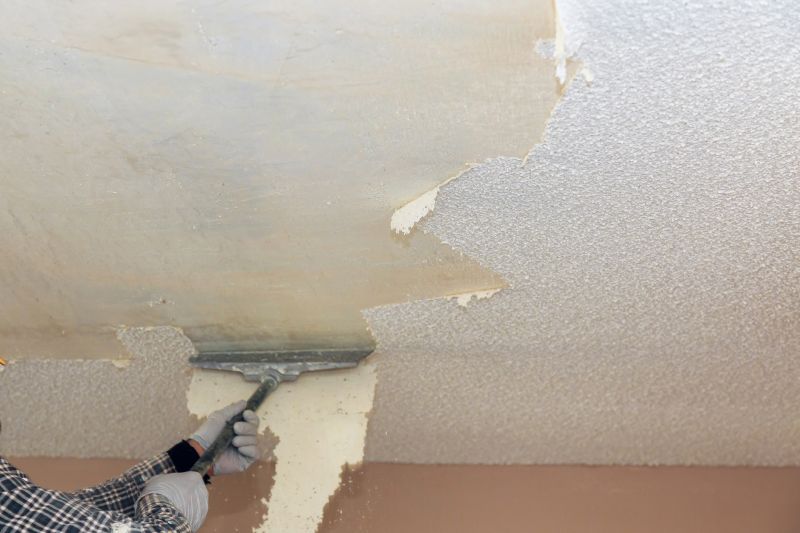Top Rated Supplies For Stipple Ceiling Removal Success
Choose from our selection of top-rated products designed to streamline your stipple ceiling removal and improve results.
 Removing stipple ceilings, also known as popcorn ceilings, can be a challenging yet manageable home improvement project. The process typically involves softening the textured surface to make it easier to scrape away, which requires the right tools and products. Many homeowners opt for specialized removal kits that include a combination of spray solutions, scrapers, and protective gear to ensure safety and efficiency. Proper preparation, such as covering furniture and flooring, is essential before starting the removal process.
Removing stipple ceilings, also known as popcorn ceilings, can be a challenging yet manageable home improvement project. The process typically involves softening the textured surface to make it easier to scrape away, which requires the right tools and products. Many homeowners opt for specialized removal kits that include a combination of spray solutions, scrapers, and protective gear to ensure safety and efficiency. Proper preparation, such as covering furniture and flooring, is essential before starting the removal process.
Top Overall Option
Multi-Use Ceiling Texture Removal Kit
A versatile kit that combines spray solutions, scrapers, and protective gear designed to facilitate the removal of stipple textures. It offers an all-in-one approach suitable for various ceiling types, helping users manage the project efficiently while maintaining safety. This kit is adaptable for different textures and can be used for both small touch-ups and larger removal projects.
Types of Products For Stipple Ceiling Removals
Spray-On Texture Softening Solutions
Chemical solutions formulated to soften textured ceilings, making them easier to scrape away without excessive dust.
Handheld Ceiling Scrapers
Manual tools designed for scraping away softened textures, available in various blade sizes for precision work.
Extension Pole Scrapers
Long-handled tools that allow for scraping high ceilings without the need for ladders or scaffolding.
Dust Containment Systems
Protective enclosures or vacuum attachments that help contain dust and debris during removal.
Protective Gear Sets
Complete safety kits including masks, goggles, and coveralls to ensure safe removal procedures.
Patching and Sanding Supplies
Materials for repairing and smoothing the ceiling surface after removal, such as spackle, sandpaper, and putty knives.
Heat Guns
Tools that use heat to soften textures, useful for specific types of stipple finishes.
Chemical Paint Removers
Specialized chemicals designed to strip paint or textured coatings from ceilings.
Electric Scraper Tools
Powered scrapers that reduce manual effort and speed up the removal process.
Vacuum Attachments for Dust Removal
Vacuum tools designed to connect with power tools or hand tools to minimize airborne dust.
Popular Choices
A widely used spray that helps loosen stipple textures for easier removal, appreciated for its ease of use.
A basic hand tool favored for its simplicity and control during removal tasks.
A versatile tool for reaching high ceilings, reducing the need for ladders.
Popular for containing debris and maintaining cleaner workspaces during removal.
Essential for safeguarding against dust and chemical fumes during the process.
Commonly used for repairing the ceiling surface after removal, ensuring a smooth finish.
Chosen for its ability to soften textures in specific removal scenarios.
Effective in loosening stubborn textures, especially on older ceilings.
Increased efficiency for larger projects, preferred by those seeking faster results.
Help reduce airborne dust, making cleanup easier and safer.
Worn to prevent dust and debris from contacting clothing and skin.
Used for smoothing out the ceiling surface after removal for a professional finish.
Selected for their ability to remove textured coatings chemically, especially on painted surfaces.
Combine reach and scraping ability, ideal for high ceilings.
Powered tools that reduce manual effort and speed up the process.
Used for smoothing the ceiling after removal to prepare for finishing.
The choice of products for stipple ceiling removal depends on the ceiling's material, age, and the type of texture applied. Some solutions are designed to soften the texture for easier removal, while others focus on minimizing dust and debris. It’s important to select products that are compatible with your ceiling type and to follow safety instructions carefully, especially when working with chemical solutions or dust-generating tools.
In addition to chemical solutions and scrapers, there are also tools designed to help with the cleanup process. These include dust containment systems, extension poles for reaching high ceilings, and protective gear such as goggles and masks. Using the right combination of products can make the removal process more manageable, less messy, and safer for the user. Always consider ventilation and wear appropriate safety equipment during the project.
Ultimately, removing stipple ceilings requires patience, proper planning, and the right products. Whether you are tackling a small area or a large ceiling, selecting suitable tools and solutions can help streamline the process. After removal, the ceiling may require additional preparation such as sanding, patching, or repainting to achieve a smooth, finished look. Proper product selection and safety precautions can contribute significantly to a successful and satisfying project outcome.
Key Buying Considerations
- Compatibility with ceiling texture type and material.
- Ease of use and ergonomic design of tools.
- Availability of safety features such as dust containment and protective gear.
- Effectiveness of chemical solutions in softening textures.
- Speed and efficiency offered by powered versus manual tools.
- Dust management features to keep workspace clean.
- Versatility of products for different ceiling heights and textures.
- Durability and quality of materials for repeated use.
- Ease of cleanup after removal process.
- Cost considerations balanced with tool quality and project scope.
- Availability of replacement parts or accessories.
- User reviews and feedback for real-world performance insights.
- Compatibility with existing tools or equipment you might already own.
- Environmental safety and odor considerations of chemical products.
- Storage and portability of removal kits and tools.
